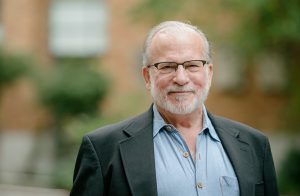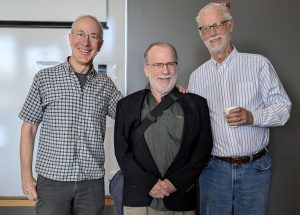
UW ECE Professor Emeritus Les Atlas. Photo by Ryan Hoover / UW ECE
On July 5, 2025, UW ECE Professor Les Atlas officially retired and was appointed professor emeritus. Atlas has been a professor in the Department for 41 years, with an adjunct appointment in the Paul G. Allen School of Computer Science & Engineering. During his time at the UW, Atlas has made many important contributions to UW ECE while producing groundbreaking research in machine learning and digital signal processing.
“Les has impacted generations of students and researchers here at the UW, and really, across the world,” said UW ECE Professor and Chair Eric Klavins in his introduction to Atlas’ last UW ECE Research Colloquium in May 2025. “I’ve appreciated having Les as a colleague during my 20 years in the Department. It’s been wonderful to hear his ideas and be inspired by his enthusiasm for engineering and everything we do in our Department.”
Atlas started his career at UW ECE in 1984 as an assistant professor, shortly after receiving his doctoral degree in electrical engineering from Stanford University. At Stanford, he studied digital signal processing, and his dissertation research was focused on cochlear implants, electronic medical devices that help people with severe hearing loss perceive sound. As a Stanford graduate student, he was also part of a research team that developed the world’s first portable, real-time speech processor for a cochlear implant. This speech processor is now part of the permanent collection of the Computer History Museum in Mountain View, California.
“My time at UW ECE has been life-changing. The academic environment here is accepting of ideas outside of the mainstream, and the quality of the students, faculty, and staff is outstanding.” — UW ECE Professor Emeritus Les Atlas
Atlas noted that when he joined UW ECE, he was interested in building on this research as well as drawing inspiration from biological systems for the next generation of electronics. He did just that in 1987, in a research collaboration that replaced simple multiplication operations in an artificial neural network with a “convolution” operation. An artificial neural network is a computational model inspired by the structure and function of the human brain. It also forms the basis for artificial intelligence. The convolution-based approach that Atlas and his colleagues introduced allowed learning components, known as “weights,” to be shared across different input locations, drastically reducing the amount of information the network needed to learn from limited data. This approach, initially applied to speech sounds, became foundational for what is now known as a “convolutional neural network” — a type of deep learning artificial neural network initially used for analyzing audio and visual data, such as sounds, images, and videos. Today, convolutional neural networks are integral to computer vision, speech and audio recognition, autonomous systems, and are within many other artificial intelligence applications, such as ChatGPT.

Atlas (center) alongside UW alumnus David Cohn (left) and Allen School Professor Emeritus Richard Ladner (right) at Atlas’ May 2025 UW ECE Research Colloquium. In the late 1980s and early 1990s, Atlas, Cohn, and Ladner were early trailblazers in machine learning and artificial intelligence. The trio introduced new ways for artificial neural networks to cope with limited training data. Their work was based on UW research exploring how babies learn to understand speech. Photo provided by David Cohn of Port Townsend, WA.
Atlas and his colleagues were the first to explicitly substitute convolution for multiplication within data-trainable artificial neural networks. Their work was, in part, built on concepts introduced in the “neocognitron,” an artificial neural network proposed in 1980 by Kunihiko Fukushima. Coincidentally, also in 1987, Professor Alex Waibel at Carnegie Mellon University independently proposed a time-delay neural network, which is mathematically equivalent to a convolutional neural network. Waibel covered this topic, and more, in a recent UW ECE Research Colloquium. Others, including Yann LeCun, vice president and chief AI scientist at Meta, made strong contributions to convolutional neural networks, culminating in LeNet-5. (LeCun delivered the UW ECE 2024 Lytle Lecture.) These contributions, in addition to work by Atlas and his colleagues, were all ingredients that contributed to the modern boom in artificial intelligence.
A bit later in his career, Atlas became inspired by research conducted by UW professors Patricia Kuhl and Andrew Meltzoff, co-directors of the Institute for Learning & Brain Sciences at the UW, who were exploring how babies learn to understand speech by using information selected from their environment. With their research in mind, Atlas and his collaborators developed strategies for artificial neural networks to intelligently select the most informative data points to learn from. He, along with his colleagues, UW alumnus David Cohn and Professor (now Emeritus) Richard Ladner in the Allen School, introduced now-standard concepts in machine learning, such as “selective sampling” (published in 1989) and “active learning” (published in 1994). These concepts offered new ways for artificial neural networks to cope with limited data.
Over the years, Atlas has been a leader in signal processing research and educational activity in the Pacific Northwest. He has had many leadership roles in the Department and in the field of electrical and computer engineering, such as co-chairing the 1998 Institute of Electrical and Electronics Engineers (IEEE) International Conference on Acoustics, Speech, and Signal Processing. His graduate students have also had significant impact — securing top faculty positions, initiating the first machine learning seminar at Google, receiving multiple Technical Emmy Awards, and founding companies, such as Redfin.
Atlas was born and raised in Milwaukee, Wisconsin. He received his bachelor’s degree in electrical engineering from the University of Wisconsin and then attended Stanford, where he received his master’s and doctoral degrees in electrical engineering. He is a Life Fellow of the IEEE, a Senior Fulbright Scholar, a Virginia Merrill Bloedel Scholar, and he has received numerous other awards and editorial roles throughout his distinguished career. His early machine learning research was funded by a National Science Foundation Presidential Young Investigator Award. His work has also been funded by a number of other businesses and organizations, including the Office of Naval Research, the Army Research Office, and the Wallace H. Coulter Foundation.
Looking forward to his new status as a professor emeritus, Atlas said that he plans to continue to enjoy his research collaborations and selected advisory roles at UW ECE. He also said that he was excited about finally getting the time to pursue a keen interest in dramatic acting — something he has wanted to do since he was a child.
“My time at UW ECE has been life-changing,” Atlas said. “The academic environment here is accepting of ideas outside of the mainstream, and the quality of the students, faculty, and staff is outstanding. I was able to propose ideas which initially got some people angry, yet I still was able to pursue those ideas. I anticipate continuing to contribute to the Department for many years to come as a professor emeritus.”
More information about Professor Emeritus Les Atlas is available on his UW ECE bio page.

